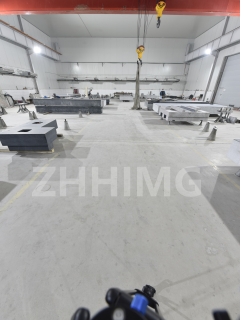Granite gas bearings are a popular type of bearing used in many heavy-duty applications, particularly in the field of CNC machining and other precision industries. Compared to traditional bearings, granite gas bearings offer several advantages, as well as some differences that are worth noting.
Similarities:
1. Load-bearing capacity:
Like other types of bearings, granite gas bearings are designed to bear loads and reduce friction between two surfaces in motion. They can hold up to heavy loads and provide a stable platform for machining operations.
2. Reduction in friction:
All bearings, including granite gas bearings, are designed to reduce friction and wear between moving parts. This means that they help to prolong the life of the machine and ensure that it runs smoothly.
3. High accuracy:
Granite gas bearings offer high levels of accuracy in precision machining applications, similar to traditional bearings. They are able to provide precise positioning and repeatable movements, making them an ideal choice for many machining operations.
Differences:
1. Material:
The most significant difference between granite gas bearings and other types of bearings is the material used in their construction. Traditional bearings are typically made of metal, while granite gas bearings are carved from solid granite blocks.
2. Self-lubricating:
Unlike other bearings that require lubrication to operate effectively, granite gas bearings are self-lubricating. They rely on a flow of gas, usually air, to create a cushion of air that reduces friction between the bearing and the shaft.
3. Thermal stability:
Granite gas bearings offer superior thermal stability compared to traditional bearings. They are able to maintain their accuracy and stability even when exposed to high temperatures, making them an ideal choice for many high-temperature applications.
4. Maintenance:
Granite gas bearings require very little maintenance compared to traditional bearings. They are able to operate without the need for frequent lubrication or other maintenance tasks, which makes them a cost-effective choice in the long run.
Overall, granite gas bearings offer many advantages over traditional bearings. Their unique design and construction make them an ideal choice for many precision machining and heavy-duty applications, offering improved accuracy, stability, and reliability. While they may have some differences compared to other types of bearings, these differences are often what make them the ideal choice in many applications.
Post time: Mar-28-2024

